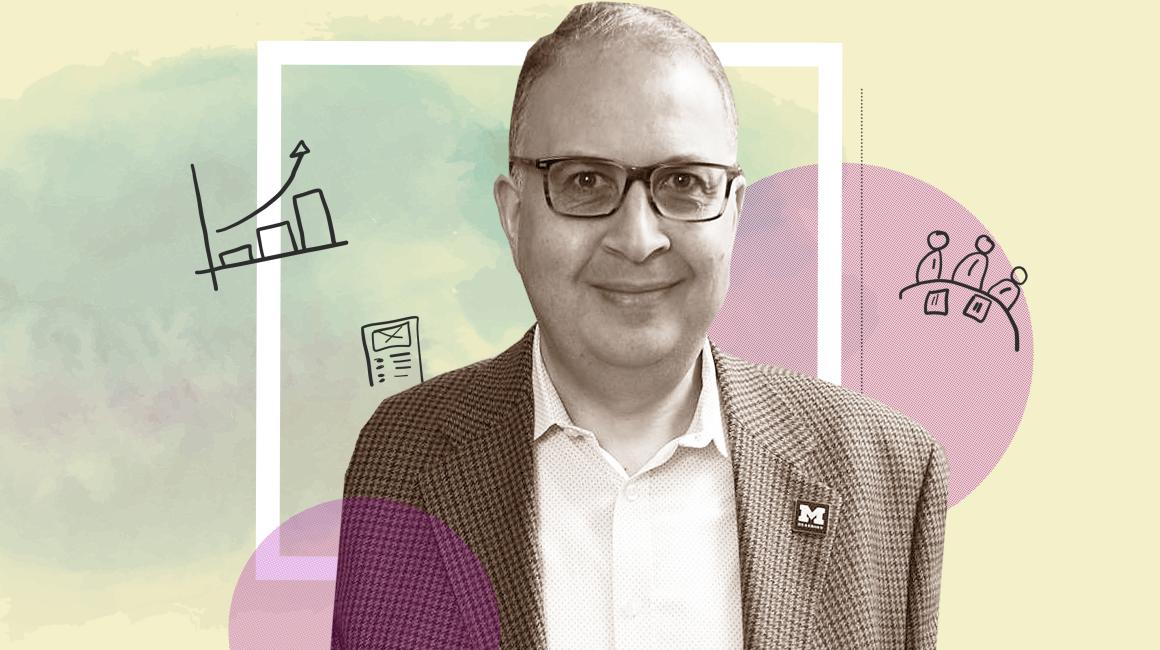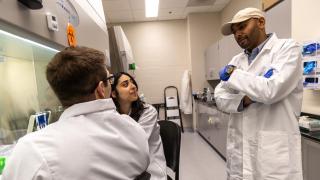
When Ghassan Kridli came to UM-Dearborn in the 1990s, engineering and computer science had a decidedly smaller footprint. The research culture was just getting a foothold. There were no doctoral programs and just a handful of master’s programs. Within the tight-knit graduate community, Kridli says it wasn’t at all uncommon for professors like him to have to co-sign apartment leases for their grad students.
The College of Engineering and Computer Science cuts a much different silhouette today. In the past decade in particular, the college has seen explosive enrollment growth that many years was measured in double digits. Today, around 2,400 undergraduates and 1,100 graduate students call CECS home — that’s more than a third of the total student population at UM-Dearborn. The faculty ranks have swelled to match, and the college has added several modern new facilities, including the recently completed Engineering Lab Building. New program announcements in emerging disciplines, like cybersecurity, human-centered design, artificial intelligence, and robotics, seem to be a several-times-a-year occasion.
As dynamic as that growth has been, Kridli, who’s been serving as interim dean since September 2020 and takes over officially as CECS dean in July, wouldn’t be surprised if the next decade brought even more fundamental changes. The forces reshaping engineering and computer science disciplines are numerous and diverse. But most fundamentally, Kridli says, technology is rapidly reshaping the role of engineers. “We’re reaching a point where artificial intelligence and machine processes can simply do a lot of what an engineer does,” Kridli says. “So we have to ask, what is our relevance? And our relevance is doing the things that a computer cannot do.”
Interestingly, Kridli says that puts engineering on a course to make friends with disciplines it’s often contrasted with: the humanities, the social sciences and art. That’s because creating a highly interactive consumer product, like a smartphone, for example, requires technical knowledge, but also a deep understanding of the humans who use it. Likewise, engineering large-scale infrastructure projects means thinking through the dynamics and resources of the local environment, and how human and non-human communities will be impacted. Similarly, cybersecurity and artificial intelligence engineers can’t just be great coders; they also have to understand the legal, ethical and social dimensions of their algorithms. And that’s a scope of knowledge that can’t be found in engineering curriculums alone.
Kridli says you can already see how such forces are reshaping engineering education at UM-Dearborn. New undergraduate and graduate programs in human-centered design, for example, teach a brand of engineering that draws heavily from sociology, psychology and anthropology. New programs in artificial intelligence are educating students not only in how to develop great algorithms, but also to understand how these algorithms may be biased based on the experience of the developers. And throughout the college, there’s a huge emphasis on project-based learning that helps students master both technical and non-technical skills. “Teamwork, communication skills, entrepreneurial thinking, multicultural competencies, empathy — that’s what employers are consistently saying they want in an engineer,” Kridli says. “So we need to be training well-rounded citizen-engineers who are technically competent, understand the societal and cultural implications of engineering solutions, are environmentally conscious, and who are able to communicate their ideas to a lay audience.”
In addition to embracing this more holistic approach to engineering, Kridli says it will be vital for the college to modernize its offerings, almost continuously, so students have opportunities to develop the most relevant skills. He likes the idea of pilot programs that enable students to explore emerging disciplines, and “mix-and-match” programs that might allow students to personalize a degree. And he’d like to take partnerships with industry beyond their advisory function, creating synced classroom and internship experiences that fully complement one another. At the same time, he thinks it’s important to invest in a few key “thrust areas,” where UM-Dearborn has a legitimate shot at developing national strength. “Practically, a college of our size can’t be good at everything — we have to focus on maybe five or six areas where we have a critical mass of talent and expertise,” Kridli says. “I would like to see us in a place where someone needs an expert in, say, electric grid security, or needs engineers who are trained in human-centered design, and their first thought is UM-Dearborn.”
Developing such strengths could also help protect students from another potentially transformative force that Kridli has his eye on. During the year-and-a-half of the pandemic, many firms had great success with their engineers working remotely, and it’s a shift that could prove permanent. Kridli says he’s already hearing from metro Detroit employers who are hiring engineers from all over the country, with no expectations that they relocate. “I think this means our location, where we are near so many industries that require engineers, cannot be taken for granted as an advantage. We have to make sure that our students can compete with an engineer who’s based in, say, Utah, and likewise, can compete for a job with a Utah employer. Companies have access to engineers that are literally everywhere now. That ground is shifting very rapidly.”
Equipped with an ever expanding list of flexible, future-oriented programs, Kridli is optimistic that he and the rest of the CECS team can keep our graduates competitive in an increasingly connected world.
###
Story by Lou Blouin. If you’re a member of the media and would like to interview Professor and Interim Dean Ghassan Kridli about the future of engineering education, drop us a line at [email protected].




